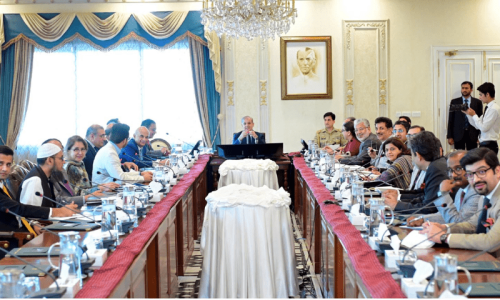ISLAMABAD, July 2: Former law minister Babar Awan said on Monday that the Supreme Court Rules, 1980, and the Contempt of the Court Ordinance, 2003, under which he is being prosecuted on contempt charge were remnants of martial laws.
“When the Supreme Court Rules were framed in 1980 the country was without any constitution and former prime minister Zulfikar Ali Bhutto had already been executed through a judicial order in 1979,” he told a bench comprising Justice Ejaz Afzal Khan and Justice Athar Saeed.
The former law minister is facing the charge for his jibe at the judiciary at a press conference he addressed on Dec 1 last year soon after the Supreme Court had ordered a probe into the memogate scandal by Tariq Khosa.
Mr Awan, who himself is arguing his case, alleged that the contempt ordinance of 2003 which usually had a life of 120 days was given a blanket protection through indemnity under Article 270 AA of the Constitution.
“With utmost heart burning, I would like to point out that the judges who had taken oath under the Provisional Constitution Order (PCO) also enjoyed protection under Article 270 AAA but they were sent home through the July 31, 2009, judgment and eventually we lost gems of judges. This is all pick and choose and in fact a doctrine of necessity,” he alleged.
Mr Awan recalled that although a seven-judge Supreme Court bench held former prime minister Yousuf Raza Gilani guilty of contempt on April 26, a 16-judge larger bench in 2007 seized with intra-court appeals in the manhandling of the chief justice had still not decided which particular contempt law was applicable. As a result all the police officers are on bail although the case has not yet been decided. Propriety demands that these appeals be decided immediately, he emphasised.
He also referred to the regrets he submitted twice especially to Justice Asif Saeed Khosa for his utterances at the press conference against his family and argued that if the remorse he had expressed were not considered by the court he would have to move an application requesting Justice Khosa to come in the witness box because being an aggrieved party he had to explain which part of the utterances he had taken exception to.
He recalled that six persons were present at the press conference and four of them spoke, but only he was discriminated by arraigning in the contempt case.
Meanwhile, Attorney General Irfan Qadir expressed serious reservations over the April 26 Supreme Court judgment of convicting the former prime minister for contempt and held the verdict illegal, void and ab initio, especially in view of the pending appeals in the chief justice manhandling case. The cases of police officers were more serious than the one that involved the former prime minister, the AG said, adding that the April 26 order by the seven-judge had changed the entire jurisprudence.














































Dear visitor, the comments section is undergoing an overhaul and will return soon.